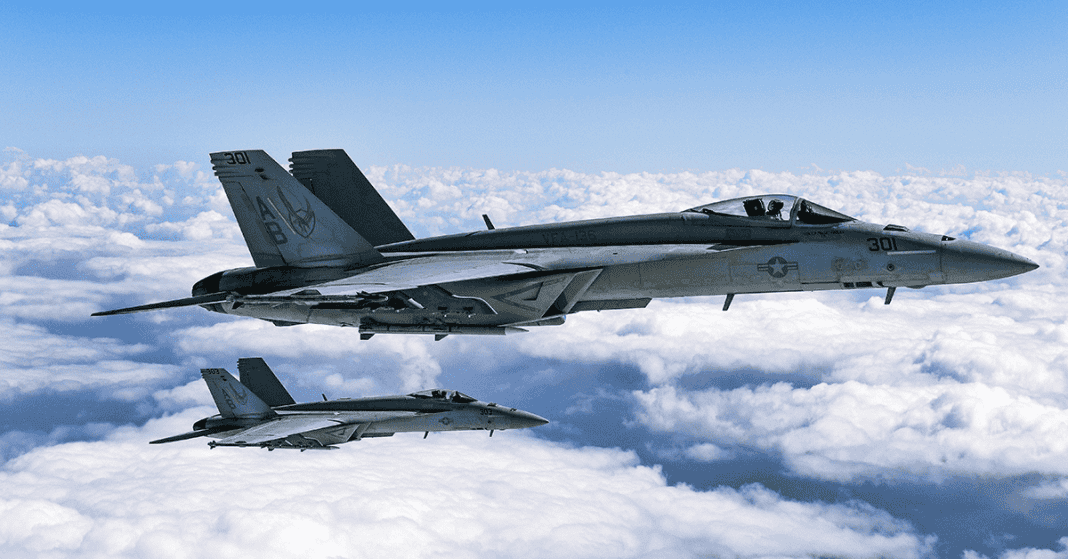The U.S. Navy has finalized a major agreement with Boeing to repair and supply essential parts for two of its most important aircraft—the F/A-18 E-F Super Hornet and the EA-18G Growler.
Boeing Secures Long-Term F/A-18 Navy Deal
The contract was announced by the Naval Supply Systems Command Weapon Systems Support in Philadelphia.
This contract is known as an “indefinite-delivery, long-term contract.” That means the Navy can keep ordering parts as needed over a period of up to ten years. The deal includes a five-year base period and a possible five-year extension. This long-term deal ensures that the Navy gets the parts it needs to keep these aircraft flying without major delays.
However, what’s getting attention is that this contract is a sole-source deal. That means only Boeing is allowed to provide the parts and do the repair work. The Navy says this is because Boeing owns the exclusive designs, tools, and software needed for these parts. This ownership makes it very hard for any other company to compete.
Boeing Stuns Defense World with $20 Billion F-47 NGAD Win, Lockheed Falls Hard
Why These Jets Matter So Much
The F/A-18 Super Hornet is the main fighter jet used by the Navy. It can take off from aircraft carriers and is used for many different missions. These include air-to-air combat, bombing missions, and support for ground troops. It uses advanced radar, like the AN/APG-79 AESA radar, and can carry a wide variety of weapons.
This jet has been used in operations all over the world, including strikes in the Middle East and patrols in the Indo-Pacific. It’s also built to survive tough environments and can handle the high pressure of aircraft carrier landings and takeoffs.
The EA-18G Growler is based on the same airframe as the Super Hornet but is designed for electronic warfare. This means it can jam enemy radar and communication systems. It uses special jamming equipment like the ALQ-218 system and carries anti-radiation missiles such as the AGM-88 HARM.
Germany and France Sound Aviation Alarm: “EU Tariffs Could Cripple Airbus-Boeing Supply Chain”
The Growler plays a key role in making sure other aircraft can safely enter enemy areas. It has been used in real-world missions, like disrupting ISIS radar systems during airstrikes in Syria. It also takes part in large military exercises with allies like Japan and Australia.
Both the Super Hornet and the Growler depend on very specific parts, many of which are considered “critical safety items.” These are parts that must meet the highest safety standards. If they fail, the entire aircraft could be in danger. That’s why the Navy insists these parts come directly from Boeing, which has the exact specifications and quality controls needed.
No Room for Rivals in This F/A-18 Contract
The reason Boeing is the only company allowed to work on this contract is because of what’s known as “intellectual property rights.” Boeing owns the blueprints, tools, and software used to make and repair these parts. Because of this, no other company can make the same parts without Boeing’s permission.
The Navy used a federal law, 10 U.S.C. 3204(a)(1), to justify the sole-source contract. This law allows the military to skip open bidding if only one company has the ability to deliver what is needed.
Other companies, like Lockheed Martin or Northrop Grumman, would have to go through a long approval process just to try to compete. This process is explained in the Navy’s official Source Approval Information Brochure. It involves proving that they can match Boeing’s technical standards and safety requirements. This can take years.
This kind of deal is becoming more common in the defense world. In the past, different companies would work on different parts of a jet. But now, because modern jets are so complex, a single company often controls everything.
For example, in Russia and China, state-owned companies handle their jet programs. In the U.S., private companies like Boeing play that role. A 2023 Pentagon report said that single-source deals like this one can raise costs by up to 20%, though the exact amount for this Boeing contract has not been shared.
Why Speed Matters: Navy Prioritizes Quick Repairs Over Competition
Still, the Navy says the deal is necessary to keep its aircraft ready for missions. Super Hornets have been busy in the Middle East and near Taiwan. Growlers have been used in exercises in the Baltic Sea and around the South China Sea. These missions put a lot of wear and tear on the jets, so quick repairs are essential.
If the Navy had to wait for other companies to get approval, it could delay critical repairs. That’s a risk the Navy isn’t willing to take, especially with global tensions rising. Boeing’s exclusive position ensures that parts arrive quickly and with the quality needed for combat-ready aircraft.
